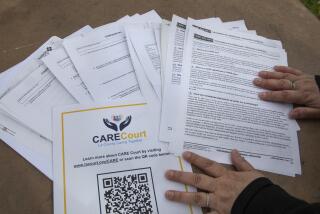2 Hospitals Sued by Widow Rest Their Case
Gloria Barronâs emotional distress may be real, but neither Humana Hospital West Anaheim nor Anaheim Memorial Hospital was the cause of the womanâs sleepless nights, pain, anger and episodes of colitis, attorneys for the hospitals said in closing arguments Wednesday in Orange County Superior Court.
The 53-year-old widow contends that she was emotionally damaged when the intensive-care staffs of the two hospitals refused to let her see her husband as he lay dying after a heart attack in July, 1984.
But the hospitalsâ attorneys claimed that a number of factors contributed to her emotional distress.
Other Women Showed Up
âThere are certainly other causes of her emotional distress,â Humana lawyer Glenn H. Clark told Judge Robert C. Todd, who is hearing the case without a jury. For example, he said, she had just found out that âthere were three other people claiming to be (Thomas Barronâs) wives, and other women (were) showing up at the hospital claiming to be his girlfriends.â
Add to that the fact that Barronâs financial status became rocky after her husbandâs death, and âthe plaintiff could not prove with any certainty that the hospital . . . caused her the emotional distress she claims,â Clark said Wednesday.
Barron also contends that she was barred from seeing her husband in the last two days of his life and that Anaheim Memorial Hospital refused to let her decide the fate of his remains.
Barron took her husband to Humana after he suffered a massive heart attack on July, 11, 1984. He was later transferred to Anaheim Memorial, where he died on July 23. Because of the confusion surrounding the patientâs marital status, both hospitals appointed his son, David Barron, 38, as family spokesman.
Was Sonâs Decision
It was David Barronâs decision to keep all visitors from the dying man in his last days, and he also made funeral arrangements for his father.
According to Anaheim Memorial lawyer Steven R. Odell, a hospital official âwas informed there was chaos in the beginning, but there was never any challenge to the spokesperson. (The officialâs) conclusion was that if you hear no problems, you assume the system is working.â
But Edi M.O. Faal, Gloria Barronâs attorney, argued Wednesday that the two hospitals should have done more to decide, for example, what would happen to Barronâs remains.
According to the state Health and Safety Code, Faal said, âunless the decedent gave instructions to the contrary, the disposition of remains should be under the control of the surviving spouse.â
Todd took the case under submission and indicated that he will rule on it in the near future.
More to Read
Sign up for Essential California
The most important California stories and recommendations in your inbox every morning.
You may occasionally receive promotional content from the Los Angeles Times.











